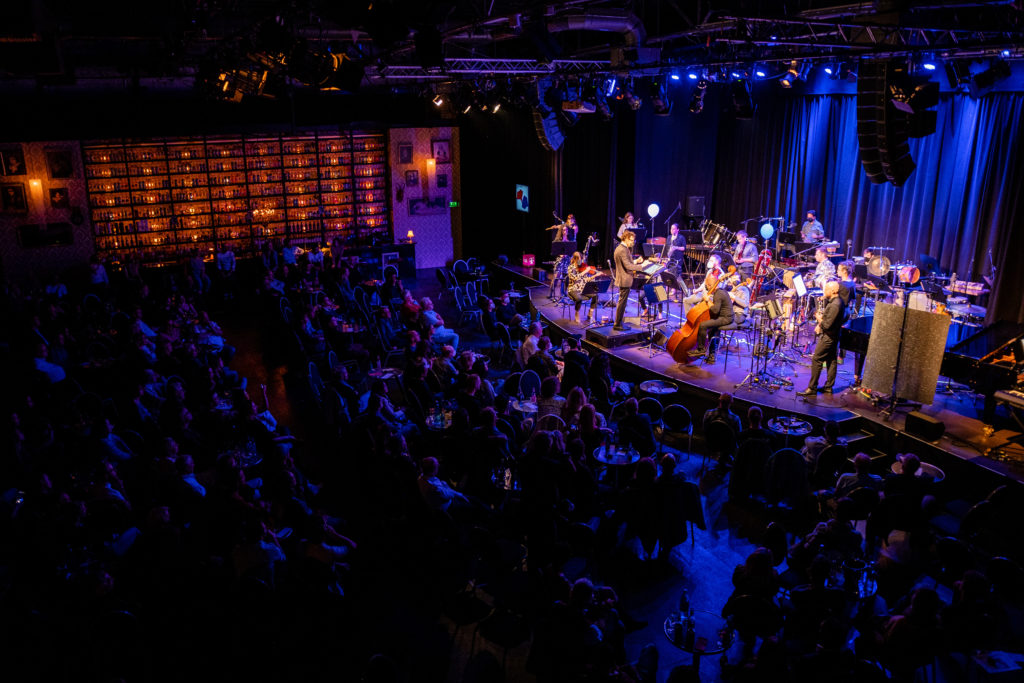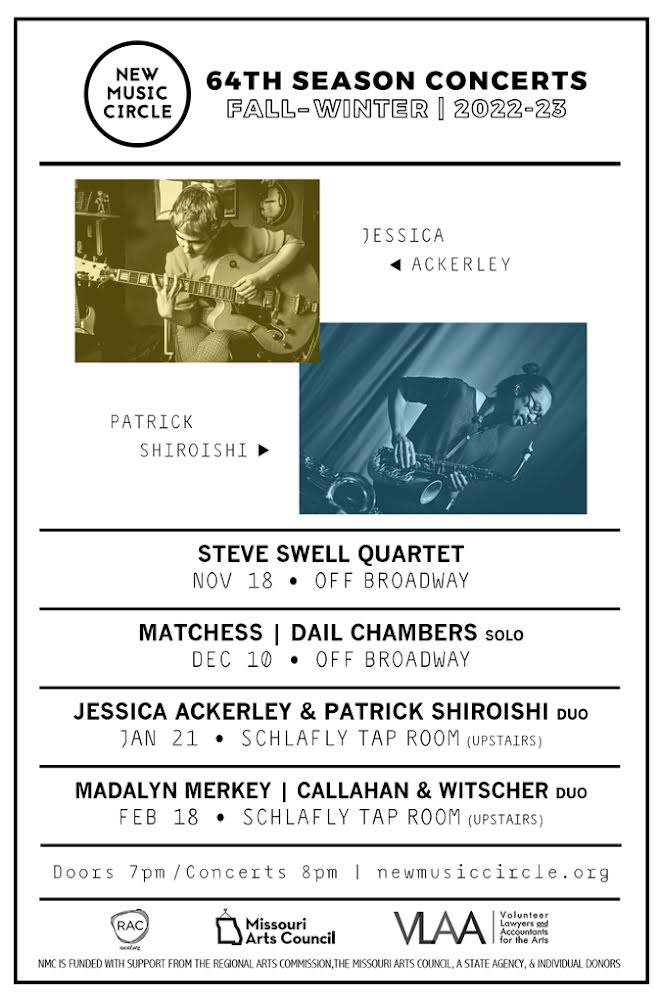

Keep in touch with AWS
Saturday, November 5th, 7:30pm
560 Music Center
Washington University in St. Louis
St. Louis, MO
PROGRAM
Jlin arr. Kim and Thompson, “Black Origami”
Jlin, arr. Santos Back Against the Wall (premiere)
“Golden Lily” (premiere; excerpts)
Fang Man, composer
Jie Guo, librettist
Catherine Chi, projection
Yihan Chen, pipa
Michael Harley, bassoon
Ah-young Hong, vocalist
Jeff Mills, Metropolis movements (premiere)
Orfe, Carol of the Bells
NOTES
Jlin arr. Kim and Thompson, “Black Origami”
“Alarm Will Sound thank you! Thank you for allowing me to be apart of such a great project! Collaborating with you all has been such a pleasure and learning experience that I will never forget. I’m very humbled you all selected me as one your collaborators.” –Jlin
The Alarm Will Sound version of “Black Origami” is an outcome of exciting collaboration among multiple creators. Of course, Jlin’s original track was already fascinating. Chris (AWS’s percussion player) meticulously transcribed and arranged the percussion parts, which is crucial considering rhythm’s significant role in this music. For example, one interesting feature of this work is its flexibility or ambiguity among the 3/4, 6/8, and 12/16 meters (I remember that Alan, Chris, and I had a long conversation about choosing the representative one.) Then, I recreated the other instrument parts. In addition to making the arrangement sound as close to the original as possible, I focused on properly translating the kaleidoscopic nature of this piece (the timbre constantly evolves) by having seamless transitions among different instruments that share single melodies. Alan (artistic director) then came up with this brilliant idea of having Dan (technical director) modify the panning of some instruments (especially those which are doing the ‘woosh’ effects) during live performances. Panning is one aspect that makes Jlin’s original piece intriguing – and now it is more ‘amplified’ in the live version. Many ensemble members also contributed by providing feedback, which I adapted when revising the arrangement. For example, John (piano) and I worked together to find the right wood slabs to get the sound satisfyingly recreating the dry clicks in Jlin’s track. I hope the audience can feel the ‘wholesomeness’ of this particular group effort!
-Texu Kim
Jlin, arr. Santos Back Against the Wall
My orchestration for JLIN’s Back Against the Wall was approached with a deliberate fidelity to the original track. In other words: the instrumental version attempts to capture the spirit of JLIN’s composition, and all of the colors and expression of its virtual instruments.
For example, the melodic lines are transcribed throughout as microtonal clusters (i.e. unison lines slightly “out of tune”), emphasizing the gritty nature of the original synthesizers, and many of the track’s “glitchy” effects are captured by extended instrumental techniques such as string overpressure, scraped percussion, etc.
The orchestration also delineates the form of the work by, for instance, shifting from a constant melodic tutti to a cello solo in the middle section—a change further emphasized by its change of tempo and meter.
I thoroughly enjoyed being part of this project—a lovely and rewarding collaboration!
– Igor Santos
Fang Man and Jie Guo, “Golden Lily”
Created by composer Fang Man and librettist Jie Guo, “Golden Lily” is a three-act opera based on the sixteenth-century anonymous Chinese novel Plum in the Golden Vase (Jin Ping Mei金瓶梅). The opera, which does not follow the original plot faithfully, is written in English, but it also uses Chinese words and (rearranged) Chinese poems drawn from the original novel. Its creators envision it to be the first of a trilogy of operas featuring the three titular characters—Golden Lily (Jin), Little Vase (Ping), and Spring Plum (Mei)—of the novel.
The original novel Plum in the Golden Vase is hailed as one of the “Four Marvelous Works” of traditional Chinese literature. Full of erotic scenes, it has been constantly banned since its appearance in the sixteenth century. Nonetheless, celebrated for its realist approach to late imperial Chinese society and nuanced portrayal of complex human nature, this novel is recognized as one of the greatest Chinese literary works of all times and has been translated into multiple Western languages. In the English-speaking world, the renowned literary scholar David Roy’s complete translation of the novel was published by Princeton University Press in five volumes over the span of ten years (1993- 2013).
The original novel has one hundred chapters and depicts hundreds of characters and centrally features the wealthy merchant Ximen Qing’s relations with his wives and mistresses. As a two-hour opera, our current project focuses on Golden Lily, one of the three main female characters in the novel. Golden Lily is arguably the most infamous femme fatale in Chinese literature. As a murderess who poisoned her first husband in cold blood, she is comparable in ferocity to Elektra, Salome, and many other controversial heroines in opera history. In addition, Golden Lily is known for her insatiable desire for men.
This opera, however, does not merely explore the dark side of this woman. Highlighting her longing to be with the man she loves and her anger at her fate of being sold from one man to another, we present Golden Lily as a woman who struggles for a better life but is only to be betrayed by people around her.
The chamber orchestra version of the first scene of the entire opera was composed for and dedicated to the Alarm Will Sound Ensemble and its artistic director Alan Pierson. Through my dear friend and colleague Mike Harley who is the bassoonist of the ensemble, I got to connect with Alan and some members of the ensemble, and we have been wanting to collaborate on this opera for years. In 2017, Mike commissioned me to compose a new work “Lament” for solo bassoon; upon this request, I composed “Lament,” which features one of the main characters Wu Dalang, the ghost of Golden Lily’s murdered husband in the opera. This work becomes one of my favorite works in recent years, and is incorporated into this chamber orchestra version of the scene. This performance also features soprano diva Ah Young Hong (Golden Lily) and Pipa virtuoso Yihan Chen.
Scene Synopsis: In this scene, Golden Lily, is keeping a “pretend” vigil for her recently deceased husband Dalang in front of an altar set up for him. Throughout the scene, Lily is haunted by the (imaginary) ghost of Dalang and her neighbors’ voices, which gossip about Dalang’s murder by her. She reminisces about her past: Her father sold her to a wealthy man, who turned her into his favorite pipa girl in the household. Out of jealousy, the man’s wife got rid of her by forcing her to marry Dalang. She also recalls the night when she murdered Dalang. Feeling haunted, she accidentally burns down the house in a frenzied attempt to drive away what she believes to be Dalang’s ghost.
Jeff Mills, Metropolis movements
These two movements are excerpts of the most recent Electronic Music soundtrack for Fritz Lang’s Metropolis (1927) by the Techno music producer and cultural icon Jeff Mills. Unlike his first soundtrack where tracks addressed specific segments of the film in a track listing form, which was created and released in 2001, this version is more a symbiotic mix of compositions that proposes a nuanced representation of the plot and storyline. As an electronic symphonic music creation, Mills proposes a few interesting points in the schematics of the material. 1- the positioning and role of the listener as the soundtrack is based on the environment of the scenes, rather than pure transcription, 2 – as a storyline that takes place in the year 2000, the choice of sound elements refer to some future commonality and foresight between the genres of Classical and Electronic music – between man and machine. And 3, in many parts of the soundtrack where sounds are played in unison. This is symbolic of the hopefulness the storyline works towards.
Creating music for Fritz Lang’s masterpiece film Metropolis over the many year has been and continues to be a great experience. The film is a story about “man vs man” with the help of a machine. Its dramatic theme is as relevant now as it was when the filmed debuted in 1927. A film to enjoyed, but also noted and examined. – Jeff Mills
Transcribing Jeff Mill’s electronic piece Transformation, The Aftershock, and Evil was equal parts rewarding and intense. On first listen, Mill’s track is striking for its emotional peaks and highly contrasting sound worlds. But the more I immersed myself in the music, the more I was drawn to the music’s persistent focus on nuance and detail. While some primary ideas repeat, each is surrounded by many secondary ideas, which are continually varied and woven together to form a grander picture with a powerful sense of depth. Transcribing so much detail was time intensive, but offered many opportunities for creativity as an arranger, particularly when paired with Alarm Will Sound’s natural virtuosity and many unique, orchestral colors. Overall though, I tried to feature all the physical and expressive capacity of live musicians to ensure that Mill’s already dramatic emotional peaks and contrasting sound worlds shine through.
–Charles Peck
One of the most formative moments for me as a composer was hearing Alarm Will Sound’s Acoustica album for the first time. I listened to it obsessively, eventually turning to the original Aphex Twin songs—a revelation in and of themselves—listening closely to how the incredible rhythms, textures, and gestures of the original were painstakingly translated to (and performed on!) acoustic instruments and marveling at the extraordinary sound world that resulted, a world that I think could never have happened without this dialogue between “electronic” and “acoustic.” This experience has transformed my approach to sound ever since, opening me up to new timbres and possibilities, and spurring me to aim for those magical moments when different worlds meet and make something remarkable.
I was ecstatic when Alarm Will Sound asked me to arrange Jeff Mills’ extraordinary music from Metropolis for them. It struck me that Jeff’s score not only cuts to the deeper emotional core in the film, but also creates another rich layer of meaning, staying true to the original while simultaneously transforming it into something new. I think of this arrangement of Metropolis: “Side F (Liaisons and Complicated Affairs)” as a translation of Jeff’s work—where I try to capture all of the richness and depth of his electronic world with the acoustic instruments of the sinfonietta—as well as an artistic dialogue. This process led me to creative places I would not have found on my own, and I am grateful to Jeff and to Alarm Will Sound for the opportunity to serve as a musical translator and to workshop and collaborate on this arrangement. I am thrilled for what we have made together.
– David Biedenbender
John Orfe, Carol of the Bells
The story behind “Carol of the Bells” contains multitudes. For starters, the source material has nothing to do with bells or even Christmas for that matter. Rather, the famous four-note hemiola ostinato and melody are a Ukrainian shchedrivka or New Year Carol. In the original folksong, a magical swallow greets a household and foretells a bounty of blessings for the coming year. Composer and educator Mykola Leontovych featured the song in several of his own works along with an a cappella choir arrangement. The Ukrainian National Chorus introduced the tune to American audiences in 36 states and 115 cities including New York’s Carnegie Hall October 5, 1922, but one year prior, Lenin’s Bolshevik secret police, the Cheka, had assassinated Leontovych. In 1936, Peter Wilhousky of NBC Radio recontextualized the song in his famous arrangement that Americans have known and loved ever since.
My arrangement consists of two polymetric rotations of the tune. The first is intended to conjure the world of fable and enchantment, where nutcrackers come to life and magical beings involve themselves in human affairs. The vehicle for this is a zoëtrope – a cylinder with a series of pictures on the inner surface that, when rotated, give the impression of continuous motion – inspired by an outstanding composition of that name by Charlie Piper, written for Alarm Will Sound at the 2012 Missouri International Composers Festival. Second is a battle hymn inspired by current events. It is dedicated to the people of Ukraine who as of this writing continue to fight for their very survival.
–John Orfe
Acknowledgements
Alarm Will Sound gratefully acknowledges our individual donors and the following foundations for their support: Aaron Copland Fund for Music, Amphion Foundation, Alice M. Ditson Fund of Columbia University, BMI Foundation, Cheswatyr Foundation, Howard Gilman Foundation, New Music USA’s Organizational Development Fund in 2022-23, Mellon Foundation, and the Sinquefield Charitable Foundation.
Additional Support provided by public funds from the New York City Department of Cultural Affairs in partnership with the City Council; the New York State Council on the Arts with the support of the Office of the Governor and the New York State Legislature; and the National Endowment for the Arts.
Additional support for “Golden Lily” provided by a USC Provost Grant.
Alarm Will Sound
Alarm Will Sound is a 20-member band committed to innovative performances and recordings of today’s music. They have established a reputation for performing demanding music with energetic skill. Their performances have been described as “equal parts exuberance, nonchalance, and virtuosity” by the Financial Times of London and as “a triumph of ensemble playing” by the San Francisco Chronicle. The New York Times says that Alarm Will Sound is “one of the most vital and original ensembles on the American music scene.”
With classical skill and unlimited curiosity, Alarm Will Sound takes on music from a wide variety of styles. Its repertoire ranges from European to American works, from the arch-modernist to the pop-influenced. Alarm Will Sound has been associated since its inception with composers at the forefront of contemporary music, premiering pieces by John Adams, Steve Reich, David Lang, Mary Kouyoumdjian, Tyondai Braxton, Augusta Read Thomas, Derek Bermel, Meredith Monk, and Wolfgang Rihm, among others. The group itself includes many composer-performers, which allows for an unusual degree of insight into the creation and performance of new work.
Alarm Will Sound is the resident ensemble at the Mizzou International Composers Festival. Held each July at the University of Missouri in Columbia, the festival features eight world premieres by early-career composers. During the weeklong festival, these composers work closely with Alarm Will Sound and two established guest composers to perform and record their new work.
Alarm Will Sound may be heard on eighteen recordings, including including For George Lewis | Autoshchediasms, their most recent release featuring music of Tyshawn Sorey; Omnisphere, with jazz trio Medeski Martin & Wood; a collaboration with Peabody Award-winning podcast Meet the Composer titled Splitting Adams; and the premiere recording of Steve Reich’s Radio Rewrite. Their genre-bending, critically acclaimed Acoustica features live-performance arrangements of music by electronica guru Aphex Twin. This unique project taps the diverse talents within the group, from the many composers who made arrangements of the original tracks, to the experimental approaches developed by the performers.
Alarm Will Sound collaborates with artists who work beyond the bounds of classical music. Alarm System, the Matt Marks Impact Fund, and Video Chat Variations, a YouTube series developed during the COVID-19 pandemic, are initiatives that have created cross-genre music with electronica artists Eartheater, Jlin, King Britt, and Rashad Becker; jazz composer-performer Dave Douglas; multimedia artists Mira Calix, Bakudi Scream, and Damon Davis; soundtrack composers Brian Reitzell and JG Thirlwell; producer Valgeir Sigurðsson, and singer-songwriter Alyssa Pyper.
In 2016, Alarm Will Sound in a co-production with Opera Theatre of St. Louis, presented the world premiere of the staged version of Donnacha Dennehy’s The Hunger at the BAM Next Wave Festival and the Touhill Performing Arts Center. Featuring Iarla O’Lionárd (traditional Irish singer) and Katherine Manley (soprano) with direction by Tom Creed, The Hunger is punctuated by video commentary and profound early recordings of traditional Irish folk ballads mined from various archives including those of Alan Lomax.
In 2013-14, Alarm Will Sound served as artists-in-residence at The Metropolitan Museum of Art. During that season, the ensemble presented four large ensemble performances at the Met, including two site-specific productions staged in museum galleries (Twinned, a collaboration with Dance Heginbotham and I Was Here I Was I, a new theatrical work by Kate Soper and Nigel Maister), as well as several smaller events in collaboration with the Museum’s educational programs.
In 2011, at Carnegie Hall, the group presented 1969, a multimedia event that uses music, images, text, and staging to tell the compelling story of great musicians—John Lennon, Karlheinz Stockhausen, Paul McCartney, Luciano Berio, Yoko Ono, and Leonard Bernstein—striving for a new music and a new world amidst the turmoil of the late 1960s. 1969’s unconventional approach combining music, history, and ideas has been critically praised by the New York Times (“…a swirling, heady meditation on the intersection of experimental and commercial spheres, and of social and aesthetic agendas.”)
Alarm Will Sound has been presented by Carnegie Hall, Lincoln Center, (le) Poisson Rouge, Miller Theatre, Brooklyn Academy of Music, the Kitchen, the Bang on a Can Marathon, Disney Hall, Kimmel Center, Library of Congress, the Walker Arts Center, Cal Performances, Stanford Lively Arts, Duke Performances, and the Warhol Museum. International tours include the Beijing Modern Festival, Now Hear This (Korea), the Holland Festival, Sacrum Profanum, Moscow’s Art November, St. Petersburg’s Pro Arte Festival, and the Barbican.
The members of the ensemble have also demonstrated our commitment to the education of young performers and composers through residency performances and activities at Princeton University, the University of Michigan, University of Maryland, Shenandoah University, the Community Music School of Webster University, Cleveland State University, University of Colorado at Boulder, University of Missouri, Eastman School of Music, Dickinson College, Duke University, the Manhattan School of Music, Harvard University, New York University, and the Massachusetts Institute of Technology.
For more information and to join the mailing list, visit Alarm Will Sound’s website at www.alarmwillsound.com
Alan Pierson
Alan Pierson has been praised as “a dynamic conductor and musical visionary” by the New York Times, “a young conductor of monstrous skill” by Newsday, “gifted and electrifying” by the Boston Globe, and “one of the most exciting figures in new music today” by Fanfare. In addition to his work as artistic director of Alarm Will Sound, he has served as Artistic Director of the Brooklyn Philharmonic, and guest conducted the Los Angeles Philharmonic, the Chicago Symphony Orchestra, the Hamburg Symphony Orchestra, the London Sinfonietta, the Orchestra of St. Luke’s, the Steve Reich Ensemble, Carnegie Hall’s Ensemble ACJW, the Tanglewood Music Center Orchestra, the New World Symphony, and the Silk Road Project, among other ensembles. He is co-director of the Northwestern University Contemporary Music Ensemble, and has been a visiting faculty conductor at the Indiana University Jacobs School of Music, the Eastman School of Music, and at the Banff Centre for the Arts and Creativity. Mr. Pierson has collaborated with major composers and performers, including Yo Yo Ma, Steve Reich, Dawn Upshaw, Osvaldo Golijov, John Adams, Augusta Read Thomas, David Lang, Michael Gordon, La Monte Young, and choreographers Christopher Wheeldon, Akram Khan and Elliot Feld. Mr. Pierson received bachelor degrees in physics and music from the Massachusetts Institute of Technology, and a doctorate in conducting from the Eastman School of Music. He has recorded for Nonesuch Records, Cantaloupe Music, Sony Classical, and Sweetspot DVD.
PERSONNEL
Kristine Poulsen, flute
Kathy Halvorson, oboe
Madison Greenstone, clarinet
Elisabeth Stimpert, clarinets
Michael Harley, bassoon
Laura Weiner, horn
Tim Leopold, trumpet
Michael Clayville, trombone
Chris Thompson, percussion
Matt Smallcomb, percussion
Peter Ferry, percussion
John Orfe, piano
Andie Tanning, violin
Jesse Irons, violin
Caleb Paxton, viola
Stefan Freund, cello
Miles Brown, bass
Daniel Ruder, Audio Engineer
Alan Pierson, conductor and Artistic Director
Gavin Chuck, Executive Director, Librarian
Peter Ferry, Assistant Director of Artistic Planning
Jason Varvaro, Production Manager
Annie Toth, General Manager
Michael Clayville, Director of Marketing



